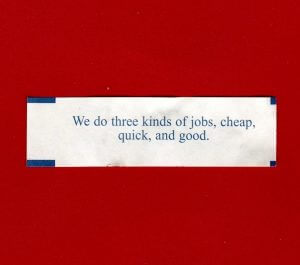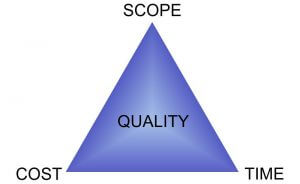Fortune Cookie Friday: Do Your Best

“Do your best.” That is what we have been told since we were children. We should do our best at whatever we do, be it school, sports, or art. If we follow this supposedly simple premise, we won’t be disappointed in the results. Is it really that simple?
Today’s fortune is based on the Project Management Triangle, also known as the Iron Triangle or Triple Constraint. This concept has been around since at least the 1950’s and is used by business professionals for, as the name implies, project management. It can also help us do better in life.

The triangle contains three interconnected parameters, time, cost, and scope, that determine the quality of a project or job. Some versions of this triangle list the constraints as time, cost, and quality. This simple version gave us the saying, “We offer three kinds of service: good, cheap, and fast. You can pick any two.” Although the fortune is similar to this version, I will use the former and more appropriate model for bettering our lives. Our ultimate goal should be quality, doing our best.
First, what one must understand is that quality in life is subjective and fluid. One person’s opinion of quality can be completely different than another’s. That quality can also vary depending on specific circumstances.
Now, when we consider the triangle, we see that if we change one parameter, then we change one or both of the other parameters in response. If we want to complete a task in a short period, it will affect the cost and scope of the job.
Applying this model to the workforce is easy. We see a direct relationship between the parameters of the triangle and the parameters in a project. Applying the model to life takes a bit more finesse.

Let’s say we have an English essay due in school. There is a due date, word count, and subject matter that we have to consider. These would correspond to the time, cost, and scope respectively. If this were any reputable school, the due date would not be subject to modification, but sometimes students can hand things in a day late and settle for a lower grade. I don’t subscribe to this policy. Why set a due date if we won’t be strict about it.
If the teacher chooses the subject of our paper for us, we don’t have a lot of flexibility here either. We can write on the topic from various viewpoints. If we had to write on Charles Dickens, we could cover his life, his writings, or about how he dealt with his fame.
The best option would be for us to choose the subject matter, but not many English teachers allow this. For those teachers that do, you offer the students an excellent opportunity to expand their minds. Thank you.
Now, we can’t forget about word count. I can hear the teacher now, “The paper must be five pages—no more, no less, double-spaced, in 12 point Times New Roman.” Whew, talk about constraints. Okay, time to adjust the margins—just kidding. There is some flexibility to this constraint. There is a big difference between having the last word being at the top of the last page or the bottom.
We have our various constraints to the paper. We start working on it right away, hopefully. If we know that we can vary one or two of the constraints, we can significantly affect the quality of the paper. We make sure we thoroughly cover the topic, in as much detail as possible, edit (don’t ever skip this step), and hand it in on time. Easy A+.
Okay, maybe it’s not so easy for some, but that’s how the triangle would pertain to school. If we did everything required, and we gave it your best, we should be happy with the outcome. A school project is just one example, but we can also apply this model to something like cleaning our room.
Our mom just gave us an ultimatum, she wants our “worst-looking-pigsty” of a room cleaned before dinner, or we can’t watch TV.

Now, hang on a second. We can do this. It’s just another project. We can’t go beyond the time constraint, so we need to focus on the cost and scope.
This clean room is our scope. We should make the bed and make sure everything is out of sight. We can’t have dirty clothes on the floor and candy wrappers on our desks. Tidying a room is very doable for even young children.
The cost parameter is the scenario has a little more nuance. I’ll be honest kids; we’re aiming for quality here; let’s not forget that. Mom’s are sticklers when it comes to clean rooms. They probably won’t settle for shoving everything under the bed or in the closet. We will actually have to clean. We have to deal with sorting through all of our stuff and, dare I say, organize it? The cost is our choice on how clean we want to make the room. How happy do we want to make our mom? On the plus side, Moms aren’t expecting us to wash down the walls and shampoo the carpet.

So, we fold the laundry and put it away. We make our beds. We put the books on the bookshelf in an orderly fashion. We even empty the trashcan. Being thorough will ultimately affect the quality of the job. When Mom returns to check on our progress, and she inevitably will, she will be pleasantly surprised at how we’ve done. We may even get a dessert after dinner. NB: This is NOT guaranteed.
When it comes to doing work and taking on challenges, we are told to do our best. We should aim for a high-quality product, but remember what I said about quality? It’s subjective. We can try to please others with our work, but it may not always be possible.
Sometimes the pressure of doing our best can be a lot to handle. We bust our butts living up to the subjective standards that others set, even if they are unattainable.
Quality is basically customer satisfaction, but it’s also balancing act. We can never be perfect, but we can play towards our strengths when part of the work is satisfactory. With a little extra effort, we can do our best and well will feel better about ourselves.




